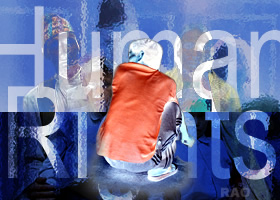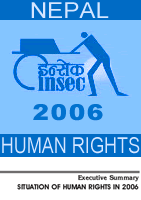|
INSEC
Human Rights Report 2006
|
 |
Defeat
of Autocracy: Way Forward to Human Rights (excerpt from the report)
Year
2006 began with the nationwide wave of protests against the king's direct
rule. On the fourth month of the year, the king bowed down before the people's
power and Loktantra awoke. With Loktantra in place and subsequent lifting
of restrictions on civil and political rights, Human Rights situation of
the country started to improve.
 |
|
| As
many as 313 persons were killed by the state and 256 were killed by the
CPN (Maoist) in the year 2006. In the aftermath of Loktantra, in accordance
with INSEC's Document, as many as 10 and 7 persons were killed in
the incidents of firing by the state and the CPN (Maoist) respectively.
Likewise, on to incidents of explosion during the period, one person died
on the hand of the state and four by the CPN (Maoist). Maoists killed two
persons by using sharp weapons. Similarly seven persons died in Maoist
"captivity" and other seven were beaten to death in 2006 in the aftermath
of Loktantra. |
|
One
person died in police custody. Based on the data of initial three months
of democratic government, one can reach to the conclusion that situation
of Human Rights improved after the establishment of Loktantra. According
to INSEC's Document, nine persons were killed and 26 arrested by the
state between the period of April 25 to August 2. During the same period,
11 persons were killed and 362 abducted by the CPN (Maoist). After founding
Loktantra the trend of killing, as during the violent conflict, virtually
came down to an end. During the hundred days of Loktantra altogether nine
persons were killed in Morang, Sindhupalchowk and Dang districts by the
state. Likewise, altogether 11 people were killed by the CPN (Maoist) in
Saptari, Siraha, Bara, Chitwan, Sarlahi, Rautahat, Sindhupalchowk, Jajarkot
and Surkhet districts. However, the situation began improving gradually.
Last year, in 2005, both the warring factions observed ceasefire for four
months. The state and the Maoists were indulged in the confrontation for
initial eight months. During that period as many as 815 persons were killed
by the state and 709 were killed by the CPN (Maoist).

|
|
RAOnline
|

|
|
|
| During
the 19 days of Jana Andolan-II beginning April 6 to 24, a total of 19 persons
were killed by the state in a bid to suppress the peaceful demonstrations.
Among those deceased, 10 were killed on the spot in police firing. Rest
nine persons died on different dates in hospitals while undergoing medical
treatment. After the completion of Jana Andolan-II the government published
the names of 25 persons as the martyrs of Jana Andolan-II. The government
paid tribute to all those who gained martyrdom during the movement against
autocracy since the year 2004.
In
fact, the success of Jana Andolan-II was the success of endeavour for peaceful
political transformation. Jana Andolan-II also mirrored the people's desire
for peaceful resolution of the violent conflict. Formation of Seven-Party
Alliance (SPA) by NC, CPN (UML), NC (D), NSP (A), NWPP, Janamorcha Nepal
and United Left Front created a new vigour in Nepali politics. The 12-point
understanding inked between the SPA and the Maoists took the anti- authoritarianism
Movement to a new height.
In
the meanwhile, the king announced municipal election in a bid to institutionalise
his autocratic audacity but his poor play was exposed throughout the world.
The
intellectuals and the common people moved forward with the aspiration to
achieve Loktantra from the beginning of the year 2006. In that course,
Human Rights Defenders first went to the street to defend civil and political
rights. They vowed against the excessive use of force over the peaceful
demonstration. Then, after achieving Loktantra, they started criticizing
the gap between the rhetoric and realities of Maoists in terms of commitments
on peace. Till the end of the year, Human Rights Defenders raised their
strong voice to provide justice to the victims of violations of Human Rights
and Humanitarian laws in the past. |
|
CPN
(Maoist), officially, expressed commitments for peaceful politics time
and again. However, some of the activities carried out by the cadres of
CPN (Maoist) even after the establishment of Loktantra give some apprehension
that they were not in favour of the peaceful transformation. This report
records several incidents of Human Rights abuses by the CPN (Maoist) even
in the aftermath of the establishment of Loktantra in 2006.
There
is a need to carry out a comprehensive study on disappeared persons in
Nepal. It is not fair to keep ambiguous situation on the whereabouts of
hundreds of people even in the Loktantra. Human Rights organisations have
been investigating on the subject as per their capacity and resources.
In this regard, Human Rights Yearbook 2007 has made an effort to present
detailed information on armed conflict induced disappearance. However,
state should initiate serious efforts to investigate the cases of disappearances.
This year, we undertake research on disappearance considering the family
members as the primary source of information. YB representatives visited
the family members of the disappeared persons to get updated information
on the matter. Surprising facts were revealed during the study. The Yearbook
2007 incorporates information that people declared disappeared by the state
were killed long before. The report published by the democratic government
on September 22 on the state of people disappeared by state remains unbelievable.
The report mentioned that Chetanath Ghimire was arrested and subsequently
disappeared from Bhorletar, Lamjung district five years ago and was in
the security base camp of the same place. But one month after the release
of the report the skeletons of Chetnath and one Shekharnath were found
in a forest near neighboring Kaski district. The remnants were identified
with the help of watches and shoes in the presence of relatives, villagers
and Human Rights Defenders.
Study
conducted by INSEC shows that as much as 783 and 105 persons were disappeared
by the state and the CPN (Maoist) respectively during the period of 1996
to 2006. Some of the cases might be missing in our record.
We
organized pre-evaluation meetings during the preparation of Yearbook 2007
for the first time this year. This year, after the compilation of data
we organized ten pre-evaluation meeting in ten districts comprising Madhes
and hill in all five development regions. Such meetings, for the verification
of data, will be organized in number of districts in times to come.
top
Source:
INSEC, 2007

|

|
Informal
Sector
Service
Centre (INSEC) |
|
INSEC
|
top

|






